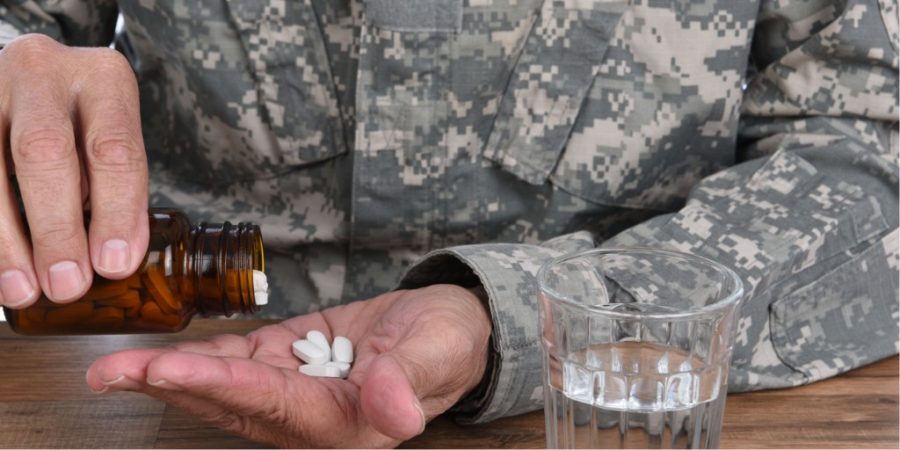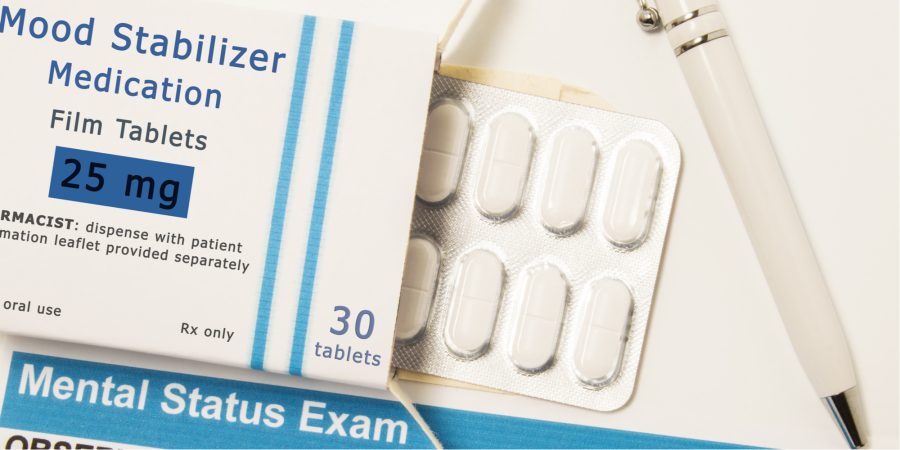
Post-traumatic stress disorder (PTSD) is one of the mental health conditions that millions of veterans face after serving. While the symptoms of PTSD are often intense and lead to unhealthy coping mechanisms when untreated, healing from this anxiety disorder is possible.
There are new successful options for treating PTSD, including taking PTSD medication. But what medications treat PTSD? And will they interfere with your progress toward recovery?
Find everything you need to know about PTSD medication in this article, and learn about your options for treating PTSD and substance abuse.
Table of Contents
Common Symptoms of PTSD

PTSD is a mental health condition that can develop after you have a traumatic experience. A traumatic event is one that significantly impacts your mental health. Examples of traumatic events include experiencing a physical accident, going through combat, etc.
In veterans, PTSD is incredibly common. But sometimes, this mental health condition goes undiagnosed because the symptoms of PTSD often look the same as the symptoms of an anxiety disorder.
Surprisingly, the DSM-5 does not define PTSD as an anxiety disorder because of its distinct symptoms and the fact that it is a mental health condition that stems from a traumatic experience.
The common symptoms of PTSD that you should know include:
- Persistent anxiety or panic attacks
- Traumatic memories
- Frequent flashbacks to the traumatic experience
- Changes in sleep patterns
- Environmental triggers
- Substance abuse
Substance abuse is one of the unique symptoms of PTSD. Addiction and mental health conditions like post-traumatic stress disorder often go together.
Turning to drugs or alcohol to cope with the painful symptoms of PTSD often happens because veterans do not get mental health treatment after having a traumatic experience. This is why treating PTSD and addiction together is incredibly important to ensure long-lasting success.
If you feel that you use drugs or alcohol to cope with emotional distress or mental health conditions like PTSD, there’s hope in substance abuse recovery programs that cater specifically to veterans like you.
It’s important to remember, too, that treatment of PTSD and substance abuse can take many different approaches—whether that’s group support, exposure therapy, recreational activities, or some other treatment of PTSD like taking medication.
Some people with PTSD benefit from taking PTSD medication to help with the emotional aspect of recovery. Read on to see the different types of PTSD medications to know if this is a type of treatment that could help you toward health and happiness.
Types of PTSD Medication
There are two main categories of PTSD medication currently in use to treat the symptoms of PTSD. But the FDA only specifically backs the use of one of these categories for treating PTSD, rather than another anxiety disorder or depression and anxiety in general.
Let’s explore the differences between these types of PTSD medication options.
Selective Serotonin Reuptake Inhibitor (SSRI)
Experts commonly recommend a type of PTSD medication called a selective serotonin reuptake inhibitor (SSRI)—otherwise known as an antidepressant.
SSRI medications work to boost your brain’s production of serotonin: the chemical found throughout your body that controls important emotional functions, like your mood.
These can really help people with PTSD to fight against depression and anxiety that comes with going through a traumatic experience when used properly and combined with addiction treatment and therapy.
This type of PTSD medication is also FDA-approved and proven to help many people with PTSD to work toward emotional and mental wellness.
According to the U.S. Department of Veterans Affairs, the most common examples of SSRIs that you might be familiar with and that the FDA recommends for treating PTSD symptoms are:
- Sertraline (Zoloft)
- Paroxetine (Paxil)
- Fluoxetine (Prozac)
- Venlafaxine (Effexor)
Studies show that a large majority of people with PTSD who use PTSD medication respond positively to SSRIs. These often improve overall mood, increase ability to cope with added stress, and reduce severe symptoms of PTSD.
Mood Stabilizers

Recently, researchers have been exploring the success rate of mood stabilizers in people with PTSD, though antidepressants like the ones listed above are much more common.
Mood stabilizers are very different from selective serotonin reuptake inhibitors. While SSRIs work to encourage serotonin production, mood stabilizers work to do exactly what their name suggests: level out your mood or make it more stable.
This means that your emotional response on mood stabilizers would be more even, protecting your brain and body from extreme ups and downs in mood changes. Mood stabilizers can be really useful for a variety of mental health conditions, especially in cases of bipolar disorder.
Types of mood stabilizers that have been used to treat PTSD in some cases include:
- Lithium
- Carbamazepine
- Lamotrigine
For people with PTSD and other co-occurring disorders, mood stabilizers and SSRIs might even be used together. No matter what challenges you might be facing, treating PTSD is possible and PTSD medications continue to improve to help you find peace physically and emotionally.
PTSD Medication Side Effects
As with any pharmaceutical, taking PTSD medication can sometimes come with the risk of side effects. Keep an eye out for these possible side effects of SSRIs in particular:
- Changes in breathing
- Sleep difficulties
- Worsened depression and anxiety
- Suicidal ideation
- Increased urges for drugs and alcohol
Additionally, you might be wondering if PTSD medication comes with the risk of addiction or prescription drug abuse. While prescription drug abuse can happen with any medication, SSRIs typically come with a very low risk for further substance abuse complications.
Be sure to always work with your team of trusted mental health professionals to find the right dosage, the right medication, and the right approach to treatment for your specific needs.
Treating PTSD and Substance Use Disorders
Of course, it takes more than just taking a pill to overcome PTSD and addiction. Professional health care that focuses on your physical, emotional, and mental wellness is also necessary to take alongside PTSD medication for long-term results.
All too often, we see veterans who are turned away from services as a result of PTSD and other mental health conditions. But at Heroes’ Mile, we know how to help veterans like you because we understand, first-hand, the trauma that can come from combat.
We are proud to offer veteran-specific services and a variety of options to help you fight your addiction. We focus on treatment to specifically address PTSD, including:
- Safe and supervised drug and alcohol detox
- PTSD medication
- Veteran-focused therapy
- EMDR and CBT therapies
- Alumni services
Reach out to Heroes’ Mile by phone at 1-888-838-6692 or by filling out our confidential online form for more information on how to start your treatment of PTSD and find your strength in recovery today.
The post PTSD Medication: Does It Help? appeared first on Heroes’ Mile Veterans Recovery Center.
Source
Original Author: Heroes’ Mile

